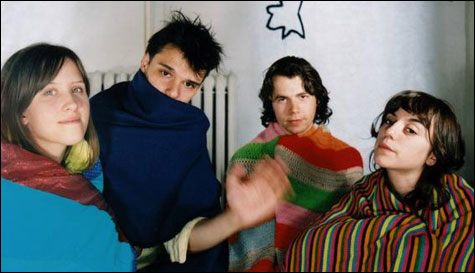
Dirty Projectors |
If the title teen of Juno can dismiss Sonic Youth as “just noise,” what would a representative of a generation for whom quiet is the new loud make of the even harsher sonic barrages of first-wave punk? That’s one question raised both by the Dirty Projectors’ Rise Above (Dead Oceans), a recasting of Black Flag’s iconic Damaged, and Jeffrey Lewis’s self-explanatory 12 Crass Songs (Rough Trade).
To ask it another way: now that everyone but a few back-in-the-day holdouts accepts the notion that the volume and aggression of hardcore are merely one expressive possibility among many, rather than the font of all authenticity, are the music’s original attitudes and ideals as dead as its sound?
For Rise Above, Projector-in-chief David Longstreth recomposed Black Flag’s debut, a touchstone of his adolescence, from memory, without reference to the 1981 SST release. A few songs (including “TV Party”) are MIA, and the lyrics are full of gaps and inaccuracies that take these versions well beyond the realm of “covers.” “Six Pack” grows a new, seemingly incomprehensible bridge that turns out (as Longstreth told the Web mag paperthinwalls) to be an Esperanto translation of Run-DMC’s “It’s like That.”
Longstreth’s arrangements supplant the originals’ single-minded thrash with a dizzying stylistic range: skittish pop ska, tangled post-rock picking, orchestral transitions, and sludgy rock recalling Greg Ginn and company’s late-career pursuit of heaviness. What these versions retain is the sense that the singer at the center of it all is being buffeted by the force of the music. But whereas Henry Rollins struggled against besieging forces, Longstreth disintegrates almost willingly, as when sections of “Depression” and “Gimmie Gimmie Gimmie” hocket between the frontman and a ghostly layer of female voices. This update replaces the Reagan-era rage of Damaged with a diffuse, post-everything anomie that makes it as precise a document of its own time as its half-remembered model.
As befits its source, Lewis’s 12 Crass Songs is as outward-directed as Rise Above is introverted. Crass bore the flag for a strain of UK punk that took the Sex Pistols’ publicity-stunt anarchism ultra-literally, shaping their lifestyle choices (squatting) and hyper-independent business practices. Anti-war, anti-commerce, and above all anti-“system,” their ethos was so pure it’s a wonder they allowed themselves to record at all. In his liner-booklet cartoons, Lewis, who plays the Paradise next Friday, makes his affinity for the band’s politics clear: “Wow, the music sounds violent but the words seem to be for ’60s idealism.”
Crass’s own recordings, with their chorused bass lines and from-hunger production values, now sound almost bouncy, but the militant bleatings of Penny Rimbaud, Eve Libertine, and Steve Ignorant are still a far cry from Lewis’s deadpan delivery, especially when it’s backed by his sprightly acoustic shuffles. (Like Juno soundtrack star Kimya Dawson, Lewis is linked with New York’s unfortunately named “anti-folk” movement.) Verbose tracks like “End Result” (“I am a product/I am a symbol. . . . I am a subject for endless, mindless debates”) evoke Jonathan Richman singing The Foucalt Reader. Some selections, notably the scene-specific “Banned from the Roxy,” don’t time-travel well, but others, including the drab domestic vignette “Systematic Death” (“She’s tried to make it nice/He’s said thank you once or twice”), are still apt. That depressing realization is relieved only by Lewis’s implicit insistence that what we’re pleased to call “everyday life” can still be questioned — if only in a song.
JEFFREY LEWIS + THE CRIBS + DRUG RUG | Paradise Rock Club, 967 Comm Ave, Boston | March 21 | 617.931.2000